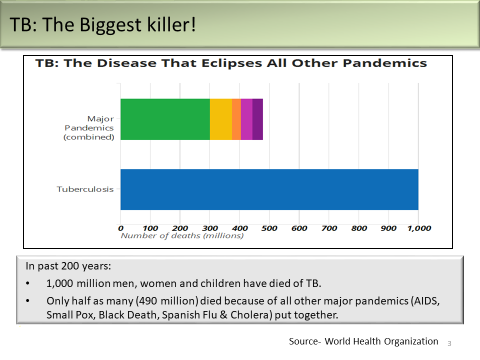“Tuberculosis is the child of poverty, and also its parent and provider”.
Nobel Laureate Archbishop Desmond Tutu
A person dies of Tuberculosis (TB) every 20 seconds. They are mostly poor.
The naturally occurring form of TB is sensitive to the four anti-TB drugs, which are used globally. It is called drug sensitive (DS) TB or just TB.
TB is an airborne infection. It spreads through bacteria which are exhaled by infectious patients who have TB inside the lungs. Each patient infects 12 others, thus leading to a quick upward spiral and epidemic. Among the disadvantaged in developing countries, every family has seen a death because of TB. So, it is known as a ‘curse from the gods’, or even ‘consumption’ and carries terrible stigma. No wonder that in India alone, 100,000 female patients are abandoned by families every year to die of disease and starvation (Government of India, TB India 2008). 300,000 youngsters join the rank of child labor annually mostly because a parent is suffering from TB, loses a job, and the child needs to support the family (Government of India, TB India 2008).
Even in developed countries, where TB had been nearly eradicated, it has come back with a vengeance.

TB is also a serious social-economic problem. World Economic Forum states, “nearly 1/3rd of over 11,000 (business leaders worldwide) expect TB to affect their business … serious(ly)”. In India alone, indirect economic loss is US$23bn annually (Government of India, TB India 2008).
TB is perhaps the biggest health crisis in the developing world. It is the biggest killer in history, having killed more victims than all other pandemics (HIV/ AIDS, Smallpox, Black Death, Spanish Flu and Cholera) put together.
No wonder, Nobel Laureate Archbishop Tutu advises again:
“Tuberculosis needs to be our next liberation struggle, next to the fight against poverty.”
